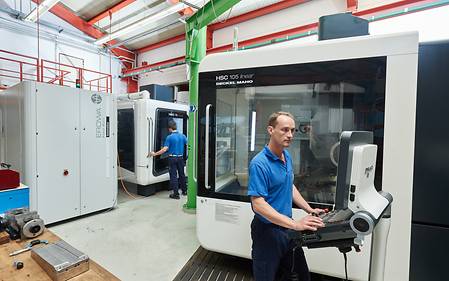Milling in finished part quality at a speed of 40,000 rpm
Werkzeugbau Erz expands its range of products in high-speed machining with an HSC 70 linear from DMG MORI
The origins of Werkzeugbau Erz date back to a service provider specialised in milling technology that was founded in 1989. The company has grown since then to become an integral supplier in the field of tool and mould making as well as injection mould technology. 15 competent employees ensure maximum quality and precision in production. An extensive machine park from DMG MORI, which includes two machining centres from the highly dynamic and extremely precise HSC series, comprises the technological basis here. The latest acquisition is an HSC 70 linear with Erowa automation.
David Erz, founder and owner of Werkzeugbau Erz tells us about the demands in production: “The production of tools for plastic injection moulding requires a lot of experience and technical expertise in machining.” Its partner company PTK-Erz GmbH & Co. KG, which was founded in 2002, has taken over the production of the required technical plastic components so that the path to injection moulding is particularly short. David Erz sees a decisive advantage in this arrangement: “It means we can cover the entire production process and therefore work flexibly and always in line with customer specifications.” By far the greatest share of the end products is intended for the automotive industry, where Werkzeugbau Erz functions as a direct supplier. The company’s range of products here includes interior parts such as trim strips, end nozzles for air-conditioning system as well as complete lights with housing.
The production of single parts is typical for tool and mould making. “And this constitutes our greatest challenge, because each tool is unique and must work the first time round”, explains David Erz. Delivery and price pressure leave no room for second attempts. The qualified master toolmaker relies on his team of experienced experts and innovative machine tool technology to meet the rising demands on productivity and the immense quality specifications: “This enables us to achieve manufacturing results in both tools and plastic parts that ensure us a clear competitive edge over cheap suppliers from the Far East.”
Maximum precision and productivity thanks to HSC machining
HSC machining centres from DMG MORI play an important role in modern production at the Werkzeugbau Erz plant. The company has been carrying out high-speed machining on the HSC 105 linear since 2012. David Erz saw the possibility of milling at a speed of 28,000 rpm as an enormous step forwards: “Thanks to high-speed cutting we achieve such excellent surfaces that in most cases reworking is no longer necessary. Neither is the EDM method in many cases due to the use of small milling tools.” This reduces both cycle times as well as production costs.
After the good experience it made with its first HSC machine – an HSC 105 linear – Werkzeugbau Erz had another 5-axis HSC 70 linear installed in 2014. The extensive equipment of this machine is especially tailored to the requirements of production at Werkzeugbau Erz. The fact that it is designed for dry machining is one example of this. “An extraction system is installed for the production of graphite electrodes and we use air cooling for hard machining” explains David Erz.
David Erz sees the significantly higher spindle speed as a significant highlight of the new HSC machining centre: “40,000 rpm enables us to produce the highest possible surface qualities with the smallest possible milling tool diameters.” One of example of this are fibre optical systems for the automotive industry, that Werkzeugbau Erz finishes using a milling cutter of just 0.3 mm. Machining accuracy has always been a major issue at Werkzeugbau Erz. As early as 2005, the company purchased one of the first machines with linear technology. In the case of the HSC 70 linear, DMG MORI has once again improved precision and heat balance with the help of a sophisticated cooling system and a thermally stable design. New HSC spindles with shaft, flange and sleeve cooling guarantee thermally stable processing conditions and up to 70 percent lower axial tool expansion.
DMG MORI also thought about productivity when equipping the HSC 70 linear and made it ready for automation solutions. Werkzeugbau Erz has connected an automation solution with robotic handling that offers space for 9 pallets and 90 electrodes. David Erz considers the investment in the new HSC machining centre as far more than simply the expansion of capacity: “In point of fact the technological possibilities offered by the HSC 70 linear extend our potential range of products.”
The loyalty of its long-standing customers and the DIN EN ISO 9001:2008 certification confirm the successful work of Werkzeugbau Erz. David Erz fully intends to maintain the upward trend of the company’s history to date. He knows that especially in times of rising competition, quality and customer-orientation will continue to gain in importance: “For us this also means that we must continuously optimize and automate our production processes if we are to remain competitive in the long term.” And not least the advances in manufacturing technology will play a key role here.







